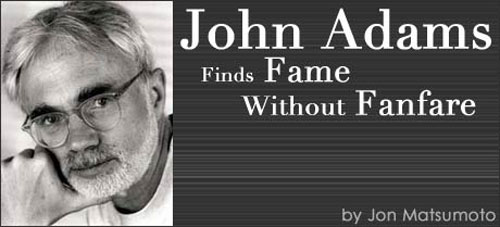John Adams Finds Fame Without Fanfare

This past April, composer John Adams was awarded the 2003 Pulitzer Prize in Music for On the Transmigration of Souls, a 25-minute work for chorus, children’s chorus, sound design and orchestra commissioned by the New York Philharmonic to commemorate the Sept. 11 attacks. The piece premiered on Sept. 19, 2002 and also employed ambient city sounds and voices reading names of the missing.
But Adams had decidedly mixed emotions about receiving the Pulitzer Prize. He stated that any honor regarding On the Transmigration of Souls should be bestowed on the New York Philharmonic and to the families of the victims of Sept. 11. He also felt the Pulitzer Prize -- while holding great weight in American journalism, arts and letters -- has not often reflected the highest achievements in American music. The prize, he noted, has unjustly eluded such vaunted composers as Thelonious Monk, Philip Glass and John Cage.
Indeed, some critics believe Adams should have been awarded the Pulitzer Prize long ago. The 56-year-old is respected so highly in the classical music world that he recently became the first living composer to have a festival devoted entirely to his work at New York’s prestigious Lincoln Center. Not bad for an artist that didn’t produce his first important pieces until he was past the age of 30.
Adams was born in Worcester, Massachusetts and grew up rural East Concord, New Hampshire. His youth was filled with music as he studied the clarinet, played in the school marching band, conducted a community orchestra and wrote his first compositions.
At Harvard University he began to focus more on composition. After hearing the experimental sounds of John Cage, Adams moved to the San Francisco Bay Area in 1971 in search of new artistic vistas. He explored unconventional sound sources and even built his own synthesizer. After composing several minimalist pieces in the late 1970s, Adams became new-music advisor to the San Francisco Symphony from 1982 to 1985.
A major turning point in his career occurred in 1983 when he met theater director Peter Sellars. The two ended up collaborating on an ambitious opera based on Richard Nixon’s historic 1972 meeting with Mao Tse-Tung. Titled Nixon in China, the opera premiered in 1987 and is now considered a classic.
Another opera, the controversial The Death of Klinghoffer, followed in 1990. The piece was about the actual killing of Leon Klinghoffer by Palestinian terrorists aboard a Mediterranean cruise ship.
Between 1997 and 2000, Adams produced three more works that that had critics singing his praises. The first was a spry piano concerto, Century Rolls. This was followed by a symphonic work, Na•ve and Sentimental Music. El Nino, an ebullient opera-oratorio, debuted at the end of 2000.
Through all the talk of him being one of America’s greatest living composers, Adams appears remarkably unaffected by the hoopla. He’s attended highly anticipated premieres of his own work dressed in jeans and a leather jacket. At his home in Berkeley, California, he often composes on a computer sketching notes in pencil and then trying them out on electronic instruments.
This past spring, the San Francisco Symphony presented the world premiere of Adam’s latest work, My Father Knew Charles Ives. It’s the first project in a long-term commissioning program between the composer and the San Francisco Symphony.






Community
Connect with BMI & Professional Songwriters